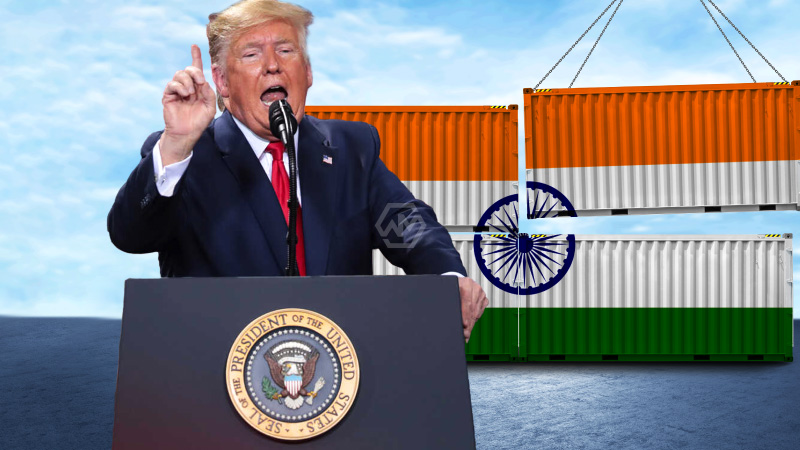- Donald Trump imposes an additional 25% tariff on Indian imports, raising total duties to 50%.
- Move linked to India’s continued purchase of Russian crude, framed as a national security threat.
- India retaliates diplomatically, calling the US action unjustified and pointing to Western double standards.
In a sweeping move that stunned international markets, former U.S. President Donald Trump has imposed an additional 25% tariff on Indian imports, citing national security concerns stemming from New Delhi’s continued purchase of Russian oil.
India responded with a rare and strongly worded diplomatic pushback, criticizing the U.S. and European Union for targeting its oil trade while continuing their own economic engagements with Russia.
India-US Trade Rift Widens: Trump Targets New Delhi with 50% Tariff Over Oil Links
Trump’s decision comes amid broader plans to introduce sweeping tariffs on multiple sectors and countries, with semiconductor and pharmaceutical imports next in line. In interviews, he signaled that certain categories could face duties as high as 250%. The aggressive trade stance appears aimed at consolidating nationalist sentiment ahead of the 2025 election while reasserting American leverage in global supply chains.
The executive order references Executive Order 14066, which frames the purchase of Russian oil as part of a national emergency impacting U.S. foreign policy interests. By invoking this, Trump bypassed congressional approval and fast-tracked the new tariffs, which will take effect in 21 days. Key Indian sectors affected include textiles, steel, electronics, and generic pharmaceuticals.
Despite the escalation, there is no formal withdrawal from ongoing strategic dialogues between India and the U.S. in defense and technology. However, analysts suggest these latest measures may derail efforts to finalize long-pending trade agreements and reduce mutual trust. The tariffs also come amid renewed talks of a U.S.-India free trade pact, which now appear stalled.
India’s response included a pointed reminder that it remains the world’s fastest-growing major economy and does not accept accusations of subsidizing conflict. Citing the hypocrisy of Western sanctions policies, New Delhi emphasized its right to sovereign energy choices. Indian officials have also hinted at reassessing U.S. defense and tech procurements as a potential countermeasure.
The Trump-imposed tariffs have reopened a volatile front in U.S.-India trade relations. With mutual accusations and hardened rhetoric on both sides, the path forward now hinges on whether diplomacy can overcome deepening mistrust.
“Injustice anywhere is a threat to justice everywhere.”
— Martin Luther King Jr.



